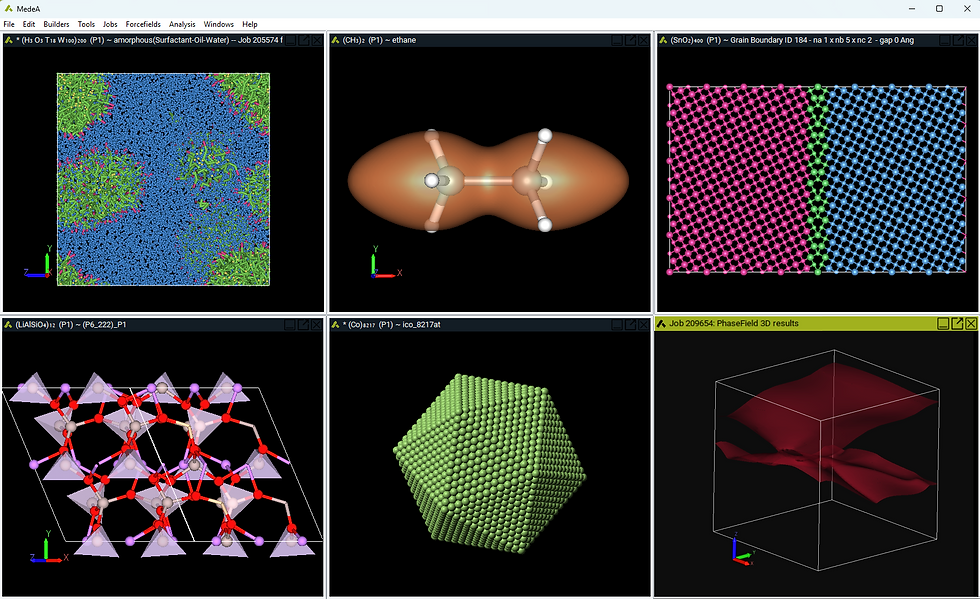Upcoming Webinar: A Multi-scale Computational Framework for Property Prediction of Fluid Mixtures
- Katherine Hollingsworth
- Mar 4, 2023
- 2 min read
A Multi-scale Computational Framework for Property Prediction of Fluid Mixtures
Leveraging limited experimental data through simulation to understand the physical and chemical properties of fluids
Illustrating the unique, synergistic value of multiscale material property simulations for understanding organic fluid properties:
Vapor-liquid equilibria (VLE)
Solubility
Surface tension
Viscosity
Thermal conductivity
Heat capacity
Fluids are central to many industrial products and processes, with applications ranging from upstream oil and gas exploration and production to #fuels, #additives, and #lubricants, as well as #pharmaceuticals and drug delivery. Improvements in industrial processes currently rely on accurate #modeling of heat and fluid flow, which require reliable data as numerical input. Due to the difficulties of obtaining experimental data of sufficient accuracy over the required ranges of temperature and pressure, fluid performance modelers are increasingly relying on powerful atomistic and multi-scale simulation techniques for the physical and chemical property values they need. The term “multi-scale modeling” comprises varying methodologies and levels of theory, starting at the #molecular level and reaching “up” to continuum methods and equations of state.
The specific fluid properties or performance characteristics one needs to understand determine the time and length scales at which simulations must be performed. In turn, the relevant length and time scales dictate the level of theory which must be applied, whether first principles, atomistic, and/or statistical mechanics approaches. By this means, simpler constituent parts of complex systems may be analyzed individually, and the knowledge gained may then be reintegrated to provide insights into the combined system or process.
Applications to organic fluids of industrial relevance abound for properties such as vapor-liquid equilibria (VLE), solubility, surface tension, viscosity, thermal conductivity, and heat capacity. Using efficient simulation workflows, we illustrate the added synergistic value of performing simulations at multiple scales for determining diverse fluid properties. We present efficient protocols for deriving simple, easy-to-use correlations for selected properties based on large simulation datasets. Specific applications are used to illustrate the accuracy, application range, and methodological limits of different approaches. We then offer perspectives and assess development trends.
Webinar Sessions
Tuesday, March 7th: Live Q&A 10:00 AM PDT (USA) 1:00 PM EDT (USA) 19:00 CET (EUROPE) Wednesday, March 8th: Live Q&A 07:00 AM PDT (USA) 10:00 AM EDT (USA) 16:00 CET (EUROPE) 20:30 IST (INDIA) Thursday, March 9th: Live Q&A 08:00 CET (EUROPE) 12:30 IST (INDIA) 15:00 CST (CHINA) 16:00 JST (JAPAN)
*Recording and Slides
Registrations will also include a link to the recording and slides after the sessions end. Please choose a day and time that works for your schedule. The one hour webinar is repeated on various days and times to fit schedules worldwide.

Dr. Marianna Yiannourakou
Dr. Marianna Yiannourakou is the Director of Product Management here at Materials Design. Marianna is an experienced simulator of fluids and soft matter and is a leader in the creation of innovative, high-quality software for property prediction. Marianna holds a Chemical Engineering PhD from the National Technical University of Athens and is widely published in fluid and condensed matter simulation.
#fluids #simulation #compchem #materialsdesign #MedeA #modeling #pharma #oil #gas #engineering #upstreamoil #vasp #gibbs #lammps #materialdesign






Comments